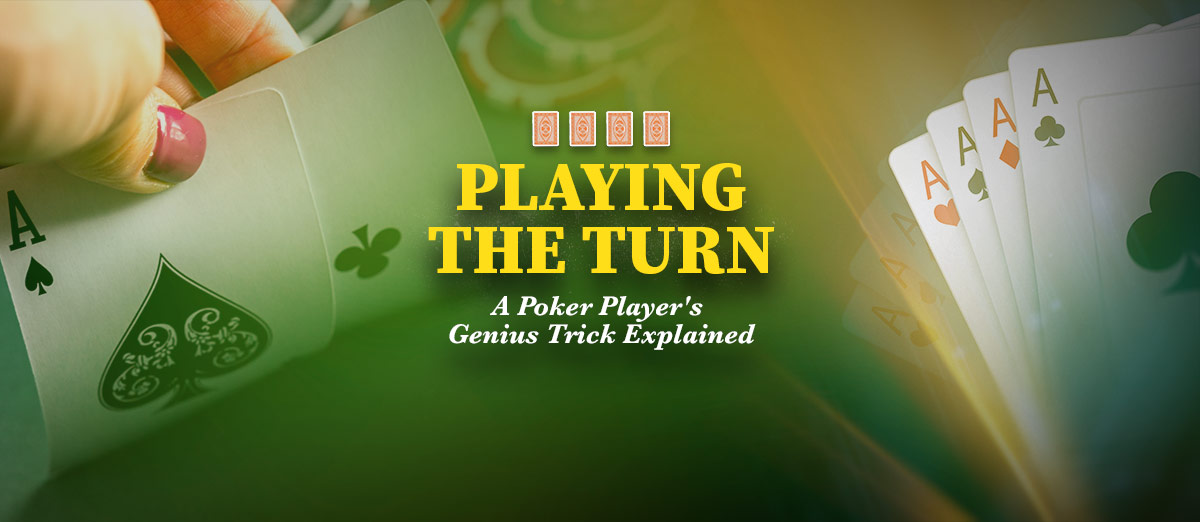Card Design Flaws - How a Famous Poker Star Beat Casinos at Their Own Game

The ongoing cat-and-mouse game between casino operators, cheaters, and advantage players has resulted in thousands of stories where players beat the house, or the house beats the players, but in most scenarios, there's a clear division of who does what.
The casino protects its own games while clever or dishonest players search for ways to defeat those games without being detected. But what if one of the smartest professional gamblers in history had a potentially unbeatable edge and needed inside help to make it work? How could he make such an advantage viable without a crooked dealer and without cheating in any way?
The answer was simple - he asked the house to do the dirty work for him.
Flaws in Card Design and How to Use Them
Every playing card back design you've ever seen contains tiny flaws that allow some cards to be rotated (turned) and identified during play. Playing the turn is the practice of identifying such a one-way characteristic and then arranging for cards of a certain value to be turned differently from the balance of the deck. One problem is finding such a deck that's actually readable under casino conditions, but the real challenge is finding a way to turn desired cards for an unbeatable advantage during play.
The simplest solution is also the most dangerous: Hire a dishonest dealer to rotate desired cards while playing and make sure they remain in this orientation through future shuffles and deals.
There are practical issues to consider, such as shift changes where new dealers, unaware of any arrangement, could potentially ruin the cheaters' advantage in the course of mixing the cards. In fact, many casino procedures can maintain a turned deck - or multiple decks - without any overt help from subsequent dealers, but you will now notice table shuffling procedures that incorporate a rotation of one stack, so any one-way advantage would be erased when the cards are mixed.
If a land based casino does not include such a rotation during shuffles, a turned deck might remain viable for hours after the crooked dealer (who set the deck) has gone home.
Even though I have found turned decks taken from live games, it has always frustrated me that such a simple scam still goes undetected, thanks to some historical failures in card design and security. That being said, I never could have predicted one of the most audacious advantage plays of all time, which needed several casinos to break their own rules.
An Acclaimed Poker Player with a Profitable Idea
Phil Ivey is one of the most dangerous poker players alive; a super smart strategist with a remarkable ability to read the table. But poker isn't Ivey's only game, and several years ago, it seemed he had taken an interest in Baccarat, played against the house, choosing to play outside of Nevada, against casinos in New Jersey and London.
He wasn't just killing time between tournaments or cash games; Phil Ivey was a serious player with serious money and was willing to bank enormous sums of cash before sitting down to play.
This made him an extremely attractive customer to casinos eager to have both Ivey and his money in their establishment, and this proved to be Phil's primary advantage for what was to follow.
All he had to do was convince them to change their own rules and order of play.
His pitch went like this: Ivey was willing to risk one million dollars, which he would deposit with the casino beforehand, but he had several requests before he agreed to play. Apparently, one of the world's most famous gamblers was superstitious when playing baccarat and would only play with dealers of Chinese origin, using brand-new cards that would thereafter be played only by him. Ivey would then instruct the dealer how each card should be flipped over during each round of play.
Amazingly - in fact, shockingly - several casinos agreed, and while I have no idea which department of each casino was responsible for approving Ivey's demands, I live in the hope that security was never consulted before such a deal was made.
Shortly afterward, Phil Ivey wired the money and flew into town with an associate who sat with him while he played. This associate just happened to speak fluent Chinese (Mandarin and Cantonese) and would chat with the Chinese dealer while making sure they followed Ivey's instructions to the letter.
The dealer was asked to show Ivey each card before it was turned face up onto the layout, and Phil - based on some kind of superstitious bullshit - would tell the dealer to turn the card end over end or side over side. Each hand would play out normally except for the novel way Ivey wanted cards to be flipped, but after a couple of rounds of play - with several decks being used and shuffled regularly, these requests would be less frequent with Ivey playing more hands per hour and winning a lot more than he should.
It still amazes me that the casino allowed this to happen, but worse (in my opinion), it's astonishing that they couldn't recognize how the cards were being flipped, turning some cards while leaving others in the same orientation.
I've said this before, and I'll repeat it here: this ploy would not have fooled a twelve-year-old after reading any rudimentary book on card tricks!
And yet, Ivey succeeded in convincing several casinos to change their own procedures with disastrous results to their bottom line. In London alone, Ivey clocked up seven million dollars in profits, but after leaving, the club returned his initial stake and refused to pay his winnings, suggesting that he may have cheated.
Let me make this clear - and I am an expert who is friends with many other experts - Phil Ivey did nothing wrong. He saw a weakness, and he exploited it in exactly the same way he would at the poker table and with similar ingenuity. Of course, the casinos (and their own paid "experts") disagree, which has resulted in multiple court cases.
Conclusion
In London, Ivey's legal team failed to convince a judge (who may never have wagered a penny in his life) that Ivey was simply a strategist who succeeded in leveraging an inherent weakness. In his summation, the judge demonstrated a stunning lack of insight, stating that while Mr. Ivey had not cheated, his actions were not in the spirit of the game.
The spirit of the game? Does such a thing exist in a Bookies office or a casino floor? When playing against the house, both sides do whatever they can to legally win the other side's money, and if one side makes a mistake, the other side is not responsible for pointing that mistake out.
In my opinion, the casino is solely responsible for protecting its own games, and if smart players identify a flaw in procedure or a kink in the rules, they have no duty or liability to share that knowledge with the house. If they listened to the true experts in the industry (and there are many) and prioritized game security, their game would never have been so vulnerable.
It's also my opinion that Phil Ivey deserved to get paid, but the British legal system was simply too naive to its own gaming regulations to tell the difference between cheating and advantage play.
I do wonder how many professional advantage players slapped their foreheads when they learned that all they had to do was ask the house to turn the cards for them and wished they had come up with the same idea.
Sadly, since Ivey and his associates (the strategy was not entirely his idea) broke the bad news that all casino cards might be flawed, you may notice changes in how games are played and how back designs are either hidden or redesigned to make playing the turn less likely.
But not impossible!





Review this Blog
Leave a Comment
User Comments
comments for Card Design Flaws - How a Famous Poker Star Beat Casinos at Their Own Game